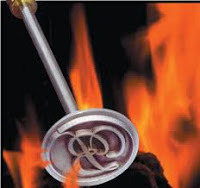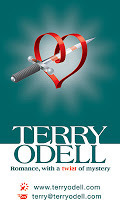Branding Is For More Than Cattle
What I'm reading: Pride and Prejudice by Jane Austin (don't laugh; I never read it). And I'm reading it primarily because I won a copy of Pride and Prejudice: The Jewess and the Gentile by Lev Raphael, and figured I needed to read the original before the mashup.
I picked up more books at the Emerald City conference, and many of them are going into my Giveaway stack. Be sure you check the Deals and Steals tab for all the different ways you can enter the contest. I'm very close to Giveaway #2 with my "likes"
 I hope you'll read through today's post, because I'd like some opinions, and I've asked a few questions at the end.
I hope you'll read through today's post, because I'd like some opinions, and I've asked a few questions at the end.
At Emerald City, I went to Angela James's workshop on Branding. She's an editor for Carina Press, which is part of Harlequin, and she made some excellent points. She also spoke about digital publishing in another workshop, which I'll save for another post.
As to Branding: it's more than a tag line. Branding is how you become known to readers.
1. Branding is a promise. She used the example of McDonald's. When you go into a McDonald's, you have expectations, because they have a very strong brand. If tomorrow, they said, "we're going to become a vegetarian restaurant", consumers would feel cheated.
2. Branding is how you stand out from the crowd. JD Robb makes a different promise to her readers than she does as Nora Roberts. Branding creates marketing opportunities.
3. Branding draws consumers in. Angela spoke of seeing a store in a shopping center called, "Wine Anthology." It immediately called to her, and she thought it would be a great place to shop. Then she noticed that there was a sign saying, "Clark Circle Liquors is now Wine Anthology." The image of Clark Circle Liquors was totally different from Wine Anthology, calling up images of seedy men carrying open bottles in brown paper bags.
An interesting point she made here was that for a mid-list author, negative reviews are not as harmful as they can be for best-selling authors. If readers aren't familiar with your work, then what they're more likely to remember is the name, and not the connection to the negative review. It's one more "touch."

She suggested that a brand should be clear rather than clever. She had 10 points about getting your brand.
1. Consistently publish quality books.
2. Write in a consistent voice/style.
3. Focus on one genre or style.
4. Write connected books.
5. Publish connected books close together.
6. Spend time marketing yourself every week—newsletters, Facebook, Twitter, etc.
7. Have a good website.
8. Have a career plan.
9. Develop your brand statement.
10. Consistently publish quality books (yes, #10 is the same as #1. It's the most important thing you should do.
Ok, so here's my question. I was fortunate enough to win a free professional video book trailer from Visual Quill. What's your take on trailers? I have to remember than just because I don't find them useful doesn't mean others don't enjoy them. Also – what's your feeling about marketing a book vs marketing the author's brand?
Like this post? Please share by clicking one of the links below.
I picked up more books at the Emerald City conference, and many of them are going into my Giveaway stack. Be sure you check the Deals and Steals tab for all the different ways you can enter the contest. I'm very close to Giveaway #2 with my "likes"
 I hope you'll read through today's post, because I'd like some opinions, and I've asked a few questions at the end.
I hope you'll read through today's post, because I'd like some opinions, and I've asked a few questions at the end. At Emerald City, I went to Angela James's workshop on Branding. She's an editor for Carina Press, which is part of Harlequin, and she made some excellent points. She also spoke about digital publishing in another workshop, which I'll save for another post.
As to Branding: it's more than a tag line. Branding is how you become known to readers.
1. Branding is a promise. She used the example of McDonald's. When you go into a McDonald's, you have expectations, because they have a very strong brand. If tomorrow, they said, "we're going to become a vegetarian restaurant", consumers would feel cheated.
2. Branding is how you stand out from the crowd. JD Robb makes a different promise to her readers than she does as Nora Roberts. Branding creates marketing opportunities.
3. Branding draws consumers in. Angela spoke of seeing a store in a shopping center called, "Wine Anthology." It immediately called to her, and she thought it would be a great place to shop. Then she noticed that there was a sign saying, "Clark Circle Liquors is now Wine Anthology." The image of Clark Circle Liquors was totally different from Wine Anthology, calling up images of seedy men carrying open bottles in brown paper bags.
An interesting point she made here was that for a mid-list author, negative reviews are not as harmful as they can be for best-selling authors. If readers aren't familiar with your work, then what they're more likely to remember is the name, and not the connection to the negative review. It's one more "touch."

She suggested that a brand should be clear rather than clever. She had 10 points about getting your brand.
1. Consistently publish quality books.
2. Write in a consistent voice/style.
3. Focus on one genre or style.
4. Write connected books.
5. Publish connected books close together.
6. Spend time marketing yourself every week—newsletters, Facebook, Twitter, etc.
7. Have a good website.
8. Have a career plan.
9. Develop your brand statement.
10. Consistently publish quality books (yes, #10 is the same as #1. It's the most important thing you should do.
Ok, so here's my question. I was fortunate enough to win a free professional video book trailer from Visual Quill. What's your take on trailers? I have to remember than just because I don't find them useful doesn't mean others don't enjoy them. Also – what's your feeling about marketing a book vs marketing the author's brand?
Like this post? Please share by clicking one of the links below.
Published on November 03, 2011 04:00
No comments have been added yet.



